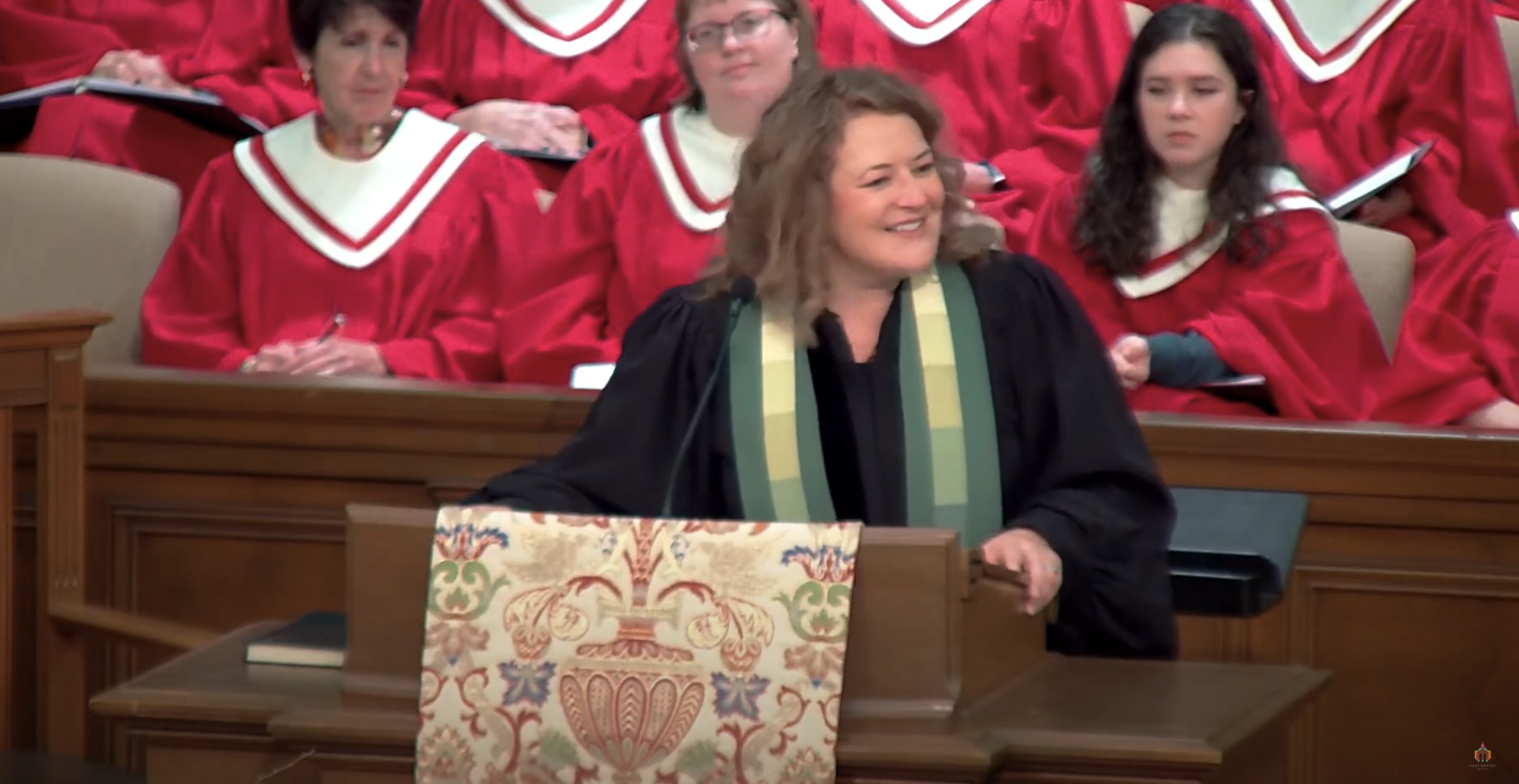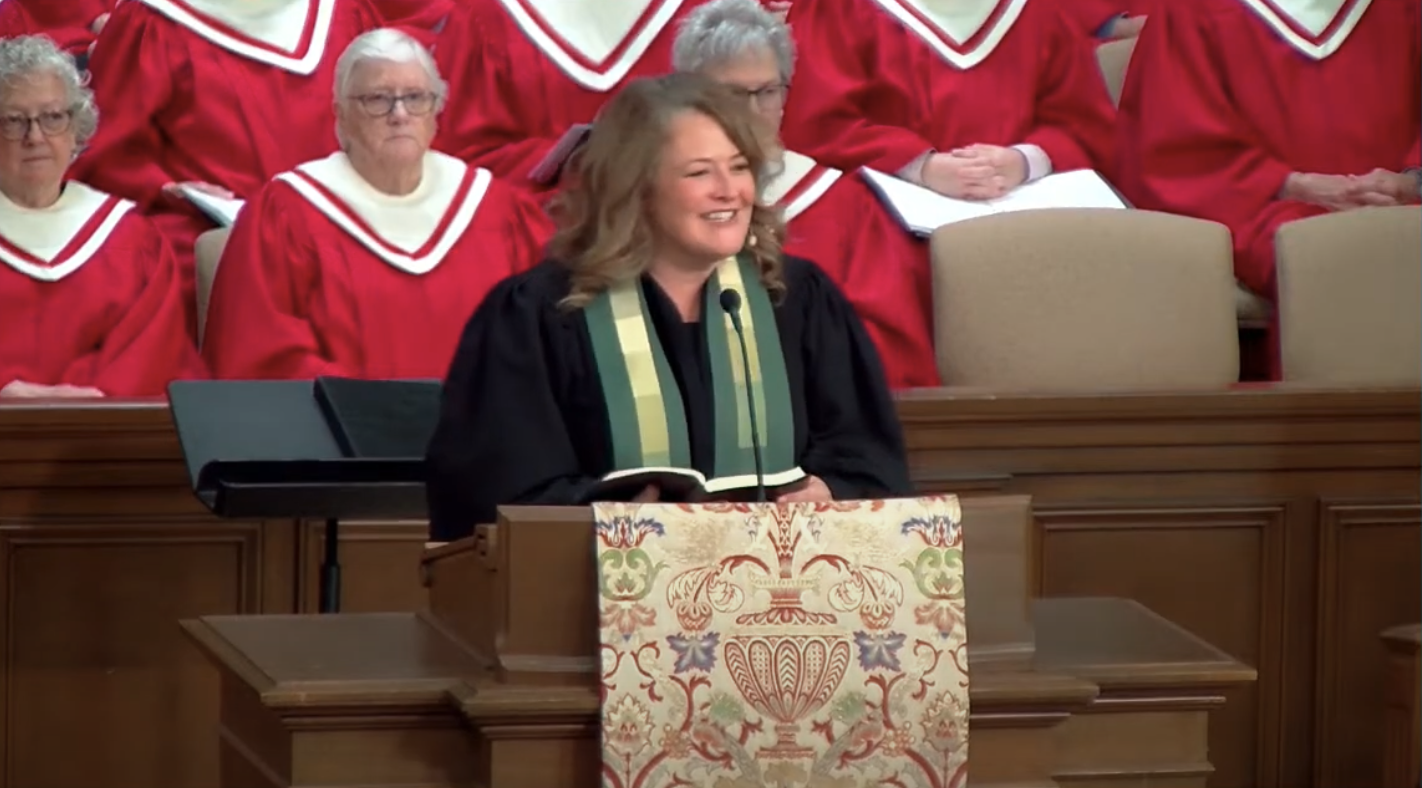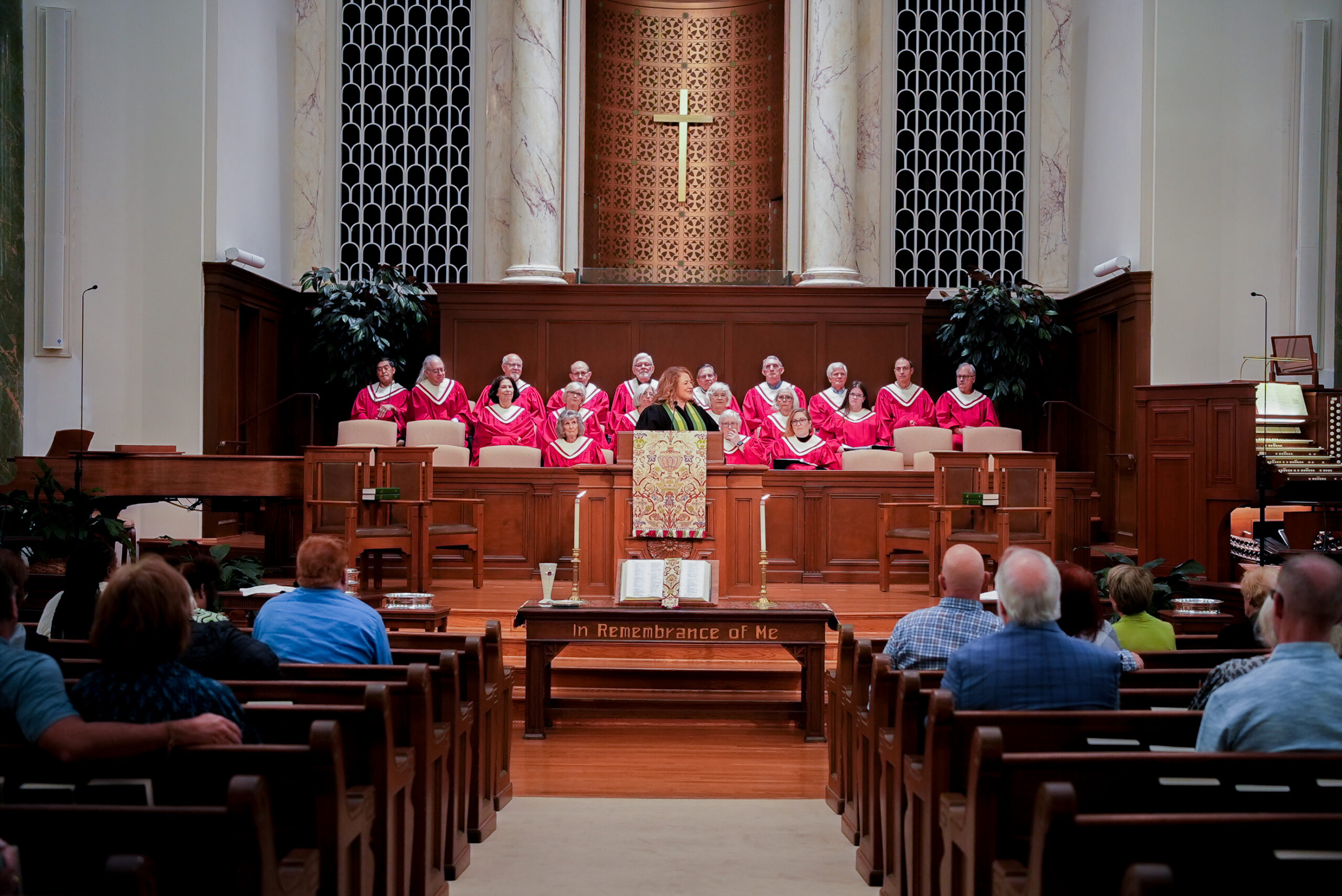I.You might be wondering, isn’t this a text we normally read at Christmas, and not October? Yes, you’d be right! Every year in our Christmas Lessons and Carols service, I have the privilege of reading the ninth and final lesson: the Prologue of the Gospel of John. “In the beginning was the Word,” John writes, full of mystery and hope as well as grace and truth. And every year, without fail, I find that my throat constricts right from the beginning, and I can barely choke out these ancient words. I can hardly look at you and this beautiful place without rivers flowing from my eyes. (Festive, isn’t it? My children love this about me.) The clutch of Light grabs hold of my heart because of you, beloved ones, for you are the dwelling place for God. You are God’s beloved creations. You are the home for the most high. It is almost too much to take in. But for today, I’ll give it a try!
II.Our sermons over the past four weeks have guided the beginning of our church house’s 100th anniversary, with an exploration of memory rooted in our theme, “home in the heart of the city.” But today, we’re going back to the very beginning as we deepen into a study this year around themes of “home.” Home – where is it? How is it? Who is there? What makes it? How we tend home. How we prepare room. How we repair home following a breach. What happens when we’re sent away from home. What displacement feels like. How we experience dislocation from home, or leaving home, or returning after a season away.
It’s a rich series of images to consider, for home stimulates our imagination and stirs our nostalgia. It surfaces our grief and grounds our hope. And these stories of home are found all throughout our holy scriptures – from beginning to end, home created and lost, restored and redefined, kept and promised. Theologian James Cone once said, “every people has a story to tell, something to say to themselves, their children, and to the world about how they think and live, as they determine and affirm their reason for being.”1 I have a hunch, then, that ours is a story of home, because ours is a story of God.
Genesis
In the beginning was God, speaking creation into being from the very center of it all. Scholars teach us that a more faithful translation of Genesis 1:1 isn’t the familiar, “in the beginning, God created the heavens and the earth” but rather, “when God began to create the heavens and the earth, the earth was a formless void.” My Hebrew professor made sure we knew the phrase tohu wa-bohu, that “formless void” of Genesis. Chaos and desolation, emptiness and nothingness, meaningless confusion, a wasteland of primordial soup… where “darkness covered the face of the deep.” There was something before creation. For when God began to create, God stepped right into the tohu wa-bohu, that the canvas of chaos was precisely the wasteland in which God began to create a home.
“Let there be light,” God said, summoning the luminous. “Let there be seas and dry land,” beckoning wave and sand and the holy middle in between. “Let there be sun and moon and stars and plants and creatures and humankind in all their variety.” All creations, all bearing sparks of the divine light, wonder from wasteland. Author Cole Arthur Riley says so poignantly, “isn’t it something that in Genesis, God makes a home for things before God makes the thing? Not the fish first but the sea. Not the bird first but the sky. Not the human first but the garden. I like to think of God hunched over in the garden, fingernails hugging the brown soil, mighty hands cradling mud like it’s the last flame in a windstorm. A God who says, Not out of my own womb but out of this here dust will I make you. Place,” she says, “has always been the thing that made us. We cannot escape being formed by it.”2
But let’s ask ourselves: why did God create? God didn’t have to do that! God didn’t have to command the grand and the tiny into themselves! What could have compelled God to do such remarkable work? In his poem, “God’s Trombones,” the great Black poet James Weldon Johnson wonders aloud: “And God stepped out on space, and he looked around and said: I’m lonely – I’ll make me a world.”3 For whatever reason, God doesn’t want to be alone. God loves company.4
Early Jewish rabbis loved to speculate about creation, and wondered among themselves if God knew the risks involved in creating the world. Creation, they said, was really God choosing to give up God’s perfect oneness. It was God choosing to literally spread the love around. To make new things, a universe filled with creatures of all shapes and sizes, even humans, which were made in the divine image, with the freedom to do something other than the will of God. The freedom to hurt each other, to kill, to destroy the very home of creation of which they’re a part. Even the freedom to forget where or whom they came from.
Did God think about these things? Surely, they determined, God must have. So why would God do this? Why make creation? Wouldn’t it have been better and cleaner and certainly less messy or maddening for God to just be perfect and complete as God without all the rest? Well the answer they came to is that for God, the risk of creation was worth one righteous person—one tzadik, in Hebrew. That if God could share in the goodness and blessing of creation with just one other—then all the risks of opening up, the risks of bringing others to the table of existence would be worth it. That God must have decided the possibility of relationship, the chance at community, the creation of home was worth all the rest of it. That even in all the disasters and the catastrophes, even in the pain and the fear, even in the certain loss and profound destruction, even in death, God determined the hope of something new – new relationships, new community, new things among us – was worth the risk.5 Or, as Madeleine L’Engle reminds us, “Love still takes the risk of birth.”6
John
In the beginning was the Word, John tells us. En te arche in the Greek, in the beginning. For in John’s telling, the beginning was where it all began. In the beginning, echoing the divine sweep of creation. In the beginning, placing Jesus right in the heart of all that was made and all that would be made. In the beginning was God.
Now the Greeks who first heard John surely loved these ethereal ideas of God. But here’s where it all changed: The word became flesh, and dwelled among us. The Word there from the beginning, the Light that enlightens all people – that Word became flesh! Took on human form! Entered the sinews of muscle and bone, organs and veins, broken hearts and full minds. As one translation says, “The Word became flesh and blood and moved into the neighborhood.”7 God didn’t need to stay ethereal, only in the ideas and concepts and beliefs. God didn’t choose to keep a distance, unmarred by the mess of this world. Rather, God came close once again. Or as one writer says, “Our God has never despised the dirt, and he once wrapped himself in dust.”8 The Word, the logos, the light, the divine tongue of God we call Jesus came and dwelled among us. It’s unthinkable, isn’t it? And yet it isn’t, because Jesus. Because Emmanuel. Because God is with us. It’s no accident that the last words of Jesus in the Book of Revelation are “I am coming soon!”9 Home at first and home at last.
III.To the fathers and mothers of Genesis, to the exiled people of Israel, to the searching kings and weeping women and denouncing prophets, to the shepherds and Pharisees and Gentiles, to the impassioned people who received the name “church,” to all creation, in all the world, through all time and space, God comes near. God makes a home. God relentlessly and unconditionally creates and nurtures and returns to and makes holy this world – as fallible as it’s been, as imperfect as it is, as flawed as it will be.
From Genesis to John to Revelation, God makes a home right here, and that is good news, full stop. Because we humans have, well, a complicated relationship with home, don’t we? When our own country’s concept of home came at the expense of taking and enslaving, God gifts us with and frees us for home. When humans drive families from their home, God takes the place wherever beloveds are. When trauma dislocates and alienates us from the places that raised us, God welcomes us home again and again. When our frenzy to buy more, and have more, and want more, and hoard more leaves us bereft of meaning, in Jesus, God gives us simple reminders of abundance: a mustard seed, a found sheep, a crowded table, a Roman cross, an empty tomb. When the billionaires stumble towards vacating this planet for another, the Word of God is made flesh once again in this ecology, this home. When isolation and loneliness robs us of belonging, God pitches their tent right here, right with us, and invites us all to come in.
So good news, folks: God is a homemaker. And when we wonder with the Psalmist: where can we go from your spirit? Where can we flee from your presence?10 The answer is nowhere. There is no place where God isn’t. The whole world, in all the wonder and wastelands of our lives, is the dwelling place for God.
That’s God’s story. But how about you? What home are you longing to make?
Perhaps it’s most obvious – perhaps you wish for your house to feel more like home, and maybe you need the encouragement today, not to go shopping, but to ask yourself, “what sounds, smells, sights, sensations, tastes would make my house feel like home?” And go do that.
Maybe you are experiencing alienation from your own body where your heart and soul call home. You feel betrayed by its failings, or displaced by its pains, or despairing by its evidence of years and stressors and sufferings. Maybe the anxieties of your mind are robbing you of a sense of home in your body.
Or maybe you feel dislocated from a more metaphorical home. Your workplace no longer bears the belonging it once did. Your political party no longer fits your worldview or hopes. A friendship no longer provides the comfort and steadfastness you cherished. An organization you love no longer conveys your deeply-held values. A perspective or posture or paradigm or practice no longer expresses who you want to be.
Perhaps most heartbreaking of all, this very world could be the site of your estrangement. You look around our country and wonder what reality are we living in?! You watch the news and can hardly imagine it getting worse. You scroll and listen, despair becoming your constant companion and source of displacement in your new world. As one theologian says, “When we carry “everywhere” around with us in our pocket, it becomes harder and harder to reside, in a truly deep sense, anywhere.”11
So I ask – what is keeping you from making a home? What is preventing you from leaving one job and finding new hope in another? What is paralyzing you from discovering a new imagination, a new perspective, a new friendship? And no matter the situation, what would it mean for you to start looking at all of it – your heart, your house, your mind, your body, your relationships, your perspectives, your losses, your griefs, even all the wonder and wastelands of this age – both as a home for God, and as a home you have agency in creating?
IV.Hugh Reid, a United Church Minister in Ontario tells this story about a man named Allan. Earlier in life Allan had left his family and home to find himself. Before he knew it, though, he ended up lost in a world of drugs, wandering the streets of Vancouver’s downtown Eastside. One night he ended up in a shelter, staring at the ceiling among bunkfulls of strangers. He didn’t know where he was, he didn’t know who he was. But he did know he wanted his suffering to end. He was determined to put himself out of his own misery.
But there in that bunk, a voice called, almost from another world. “Is Allan Roberts here?”
Well that was his name, but he hardly knew Allan Roberts anymore. It couldn’t be him being called.
“Is there anybody named Allan Roberts here?” the voice persisted.
No one else answered and so Allan took a risk. “I’m Allan Roberts.”
“Your mother’s on the phone.”
You’ve made a mistake, Allan said. “I don’t know where I am, how could my mother know where I am?”
“If you’re Allan Roberts, your mother’s on the phone.”
Unsure what to expect, he went to the desk in the hall and took the receiver. “Allan,” said his mother. “It’s time for you to come home.”
“Mom,” he said. “I don’t know where I am. I have no money, you don’t know what I’m like anymore. I can’t go home.”
“It’s time for you to come home,” she said. “There’s a Salvation Army officer who’s coming to you with a plane ticket. He’s going to take you to the airport to get you home.”
The thing is— Allan’s mom actually didn’t know where he was. She just called every shelter and hostel and hotel for months until she found him.
He went home to Ontario, supported and loved by his mother, who had never ceased to know him even though he had forgotten himself. And, inspired by the faith that had sustained his mother’s hope and love and risk and home, Allan began attending church services at Hugh Reid’s Church. Allan had shown up that day asking to be baptized.
But Reid realized it wasn’t Allan who was doing the seeking. “Allan did not find his own way to my office . . .” he said. “A path, not of his own making, [was] made by the love that found him, that knew him better than he knew himself. And that love invited him [home] –to [be baptized]. To follow Jesus.”12
Friends, love still takes the risk of birth. God still makes home for us all. And you, friends, are God’s beloved creations. You, friends, are the dwelling places for God.
Welcome home! Amen.







